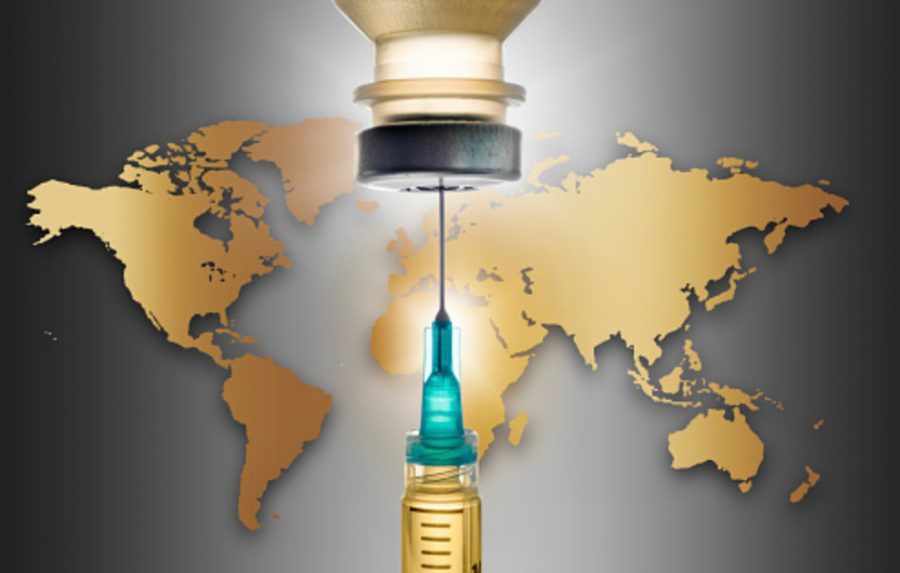COVID-19: Vaccine may not bring back normalcy anytime soon
Covid-19 vaccine with world map in background. (Photo courtesy of Getty Images.)
Humanity can breathe easier, for the vaccines for COVID-19 are showing promising results. On Nov. 9, Pfizer and BioNTech, two companies aiding in research for a vaccine together, announced in a press release that a volunteer for the COVID-19 vaccine tested 90% effectiveness against COVID-19 in phase 3 clinical study without any serious side effects in early testing. On Nov. 16, Moderna, a Massachusetts-based company, announced their early testing vaccine results with a 94.5% effective against COVID-19.
The U.S. Department of Health and Human Services Secretary Alex Azar appeared on Good Morning America on Nov. 16. He said the vaccines from Moderna and Pfizer are already being produced with hopes that enough will be made by the end of December to vaccinate 20 million of the most vulnerable citizens in the United States. George Stephanopoulos asked Azar who will be vaccinated first, “We’re going to follow the guidance. Once the full data package is in, then we’re going to follow the guidance of the CDC,” said Azar.
“It’ll be wherever it’s going to add the most value according to the data and the science and the recommendations of our experts,” Azar said.
According to The Guardian, Moderna said it could potentially manufacture 1bn doses by the end of 2021. Pfizer/BioNTech had said they would possibly produce 1.3bn vaccines in the same timeframe.
With the cases of COVID-19 only increasing with haste, the announcement of the vaccine trials showing promising results brings many questions, with one of the main ones being: How will life be after everyone is vaccinated?
Life after COVID-19 will be celebratory as humanity will cry out in happiness for the end of the pandemic; however, that does not mean life will be normal instantly.
Unlike previous pandemics, where life seemed to go back to normal rather quickly, COVID-19 may prove to the one where normalcy may take time. In a month alone, the U.S. is hoping to vaccinate 20 million of its most vulnerable people. The keyword here is ‘hoping.’ Not to be an early Grinch, but that is not a word that guarantees; it’s a guessing word. The U.S. is guessing that it may have 20 million vaccines ready by the end of the year.
Hypothetically, let’s say that the U.S. reaches its goal and vaccinates 20 million people, and they continue to produce 20 million monthly. That would mean 240 million vaccines would have been dispersed to the US populace. That’s a massive number, but there is one problem.
The United States has, according to the Census, over 330 million people, excluding those who aren’t accounted for by the Census.
By the end of 2021, 90 million people would not have received the vaccine. That means that despite the dramatic decrease of COVID-19 cases, 90 million children, adults and elders, are still vulnerable. Remember, this is all hypothetical. This excludes the statements made from Moderna and Pfizer/BioNTech’s goals of producing billions by the end of 2021 and other possible helping hands from other countries.
On a different note, getting vaccinated doesn’t mean you aren’t completely immune. People today still contract mild Chicken Pox even though we get the vaccine shot for it between 12-15 months after birth. Every year we are told to get the recently updated flu shot because the flu is still evolving. Vaccination doesn’t equal immunity. It just gives the body a better chance of fighting off the disease.
The news of a vaccine is wonderful. It may be the best news we’ve heard in 2020, but the vaccine doesn’t mean the end of the COVID-19 as a whole. Science doesn’t fully understand influenza. In fact, it’s still a mystery as to why the Spanish Influenza of 1918 just disappeared, with the best guess being that all those who were infected by it either grew immune to it or died because medicine and science weren’t advanced enough back then. The so-called ‘Miracle Drug,’ aka aspirins, for the Spanish Flu, was proven to be false and only aided in killing people faster due to overdosing.
The pandemic will be over, but COVID-19 will most likely remain with us. We won’t be able to contract it as easily. COVID-19 cases may appear here and there, but it may not be something too big to bring up the possibility of another worldwide shutdown.
Life will return to normal soon. It may happen in 2021 or 2022, depending on how fast vaccines are manufactured and administered. But heed the possible warnings and guidelines that could come with the vaccine. If we don’t properly follow the rules as people, we may prolong the return of normalcy. We all ache for that feeling again; we’re all tired of wearing masks, of social distancing, of not being able to hang out in large groups of people and much more. But personally, I’d rather follow more rules that could come with the vaccine than prolong that normal life again into 2023.
The vaccine is here, everyone. The end of the pandemic is inevitable. Let the records show that 2020 started terribly, but it may end in good graces.

Omar Romero is the online editor, staff reporter for The Chaparral. His career goal is to become either a sports radio host, sports commentator on television...

